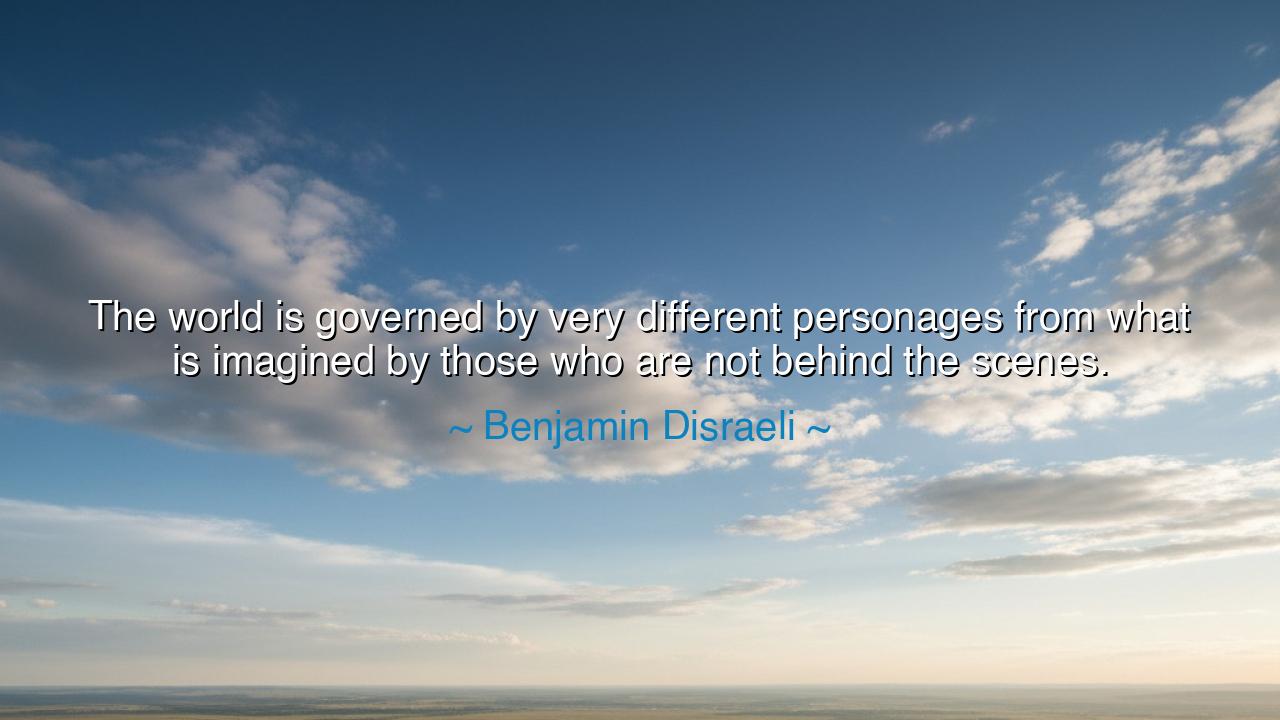
The world is governed by very different personages from what is
The world is governed by very different personages from what is imagined by those who are not behind the scenes.






"The world is governed by very different personages from what is imagined by those who are not behind the scenes." Thus spoke Benjamin Disraeli, the statesman, novelist, and master of political insight, whose words unveil one of the most unsettling and profound truths of human civilization. In this sentence, Disraeli reminds us that the visible powers—the kings, the ministers, the faces that appear before the people—are often but shadows of greater forces that move unseen. The true rulers of the world are not always those who sit upon thrones or speak from podiums, but those who, behind the veil of public life, pull the strings of destiny—the financiers, the advisers, the strategists, the invisible architects of power.
The origin of this quote lies in Disraeli’s own life and experience. Born into a world of intrigue and hierarchy, he rose from humble beginnings to become one of the most influential Prime Ministers of Britain. He was not merely a politician; he was an observer of the hidden machinery of empire. In his writings, particularly in his novel Coningsby, he unveiled his awareness of how nations are shaped not by the visible hands of statesmen, but by invisible networks—alliances of influence, wealth, and will. Having walked the corridors of power, Disraeli saw clearly what others could only imagine: that politics, like theatre, has both a stage and a backstage, and that those who stand before the curtain are seldom the ones who wrote the play.
In these words, Disraeli speaks not only of politics, but of the nature of human society itself. For in every age, from the kingdoms of antiquity to the republics of today, power conceals itself beneath layers of ritual and respectability. The pharaohs had their priests; the emperors had their courtiers; the modern rulers have their advisers and financiers. The names may change, but the truth remains: those who appear to govern often serve deeper masters, whether those masters are wealth, ideology, or unseen interests. To understand this is not to despair, but to awaken—to see the world as it is, not as it pretends to be.
History offers countless examples of this hidden governance. Consider the story of Cardinal Richelieu, the minister of France in the seventeenth century. While King Louis XIII wore the crown, it was Richelieu who wielded the power. Behind his scarlet robes lay the mind that shaped France’s destiny, directing its armies, manipulating its alliances, even choosing which words the king would speak. The world believed it was ruled by a monarch; in truth, it was governed by a priest. And so it has ever been—the faces change, but the invisible hands of influence remain constant, guiding the visible world like a puppeteer behind the curtain.
Disraeli’s insight also reveals something deeper about human perception. We are creatures who love appearances. We take comfort in symbols—the flag, the title, the crown—and believe that they embody authority. Yet the wise know that appearances are masks, and that power wears many disguises. Those who are not “behind the scenes” see only what is presented to them: the theatre of leadership, the spectacle of governance. But those who step beyond illusion perceive the machinery beneath the stage—the web of power that binds the rulers and the ruled alike. To glimpse this truth is to awaken from the dream of simplicity and to enter the realm of understanding.
Yet there is danger in this knowledge. For to see the world’s hidden order is to risk cynicism, to fall into despair and believe that truth and justice have no place in the affairs of men. But Disraeli himself did not preach despair. He believed that knowledge of hidden power should not make one bitter, but wise. Those who see behind the veil must not curse the shadows—they must learn to walk among them with clarity and purpose. The world will always have its unseen rulers; what matters is that the awakened soul does not become their pawn. Wisdom, not resentment, is the fruit of understanding how the unseen shapes the seen.
So, my children of reason and reflection, take this teaching as both warning and light: the world is not as it appears. Do not be deceived by the glitter of crowns or the eloquence of speeches. Seek to understand who truly commands, and why. Study the forces that move men, the motives that lie beneath words, the power that flows silently through money, influence, and belief. For only by seeing the unseen can you become truly free. The ignorant man is ruled by illusions; the wise man rules himself through understanding.
And remember always the wisdom of Disraeli: "The world is governed by very different personages from what is imagined by those who are not behind the scenes." Let this truth sharpen your discernment but not darken your heart. Learn to look beyond appearances—to question, to seek, to perceive the hidden patterns of power and purpose. But let knowledge not harden you into suspicion; let it awaken in you the resolve to act with integrity amidst the world’s deceptions. For though the unseen may govern the world, it is the awakened spirit—fearless, discerning, and steadfast—that governs itself, and in doing so, becomes greater than any master behind the veil.






AAdministratorAdministrator
Welcome, honored guests. Please leave a comment, we will respond soon